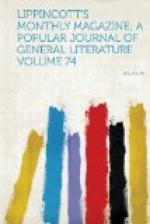A winding macadamized road leads up the river bank to the main street running parallel with it. There is a short cut by a rickety stairway, but, as some steep climbing has to be done before reaching the lower step, it is seldom used. These formerly led directly to the Hale House, a fine brick building, which faced the river, with a commodious portico, and offered the further attractions of a pleasant interior and an excellent table; but now a blackened space marked its site, as though a huge tooth had been drawn from the city’s edge, for one morning a neighboring boiler blew up, carrying the Hale House and much valuable property with it, but leaving the owners of the boiler.
“Dat’s where de Hale House was, boss, but it’s done burned down. I’s de porter yit. When it’s done builded ag’in I’s gwine back dar. Dis time I take you down to de St. Albert. I’s used to yellin’ Hale House porter so many years dat St. Albert kind chokes me.”
So to the St. Albert went the Doctor and Professor, where they met with a home-like greeting from its popular host.
Wheeling was formerly the capital of West Virginia, but for good reasons it was decided to move the seat of government from “that knot on the Panhandle” to Charleston. A commodious building of brick and sandstone, unchristened as to style of architecture, has been erected for the home of the law-makers; and henceforth the city which started around the little log fort built in 1786 by George Glendermon to afford protection against Indians will be the seat of government for the great unfenced State of West Virginia. Its business enterprise and thrift, its excellent geographical and commercial position, its healthiness notwithstanding its bad drainage, or rather no drainage, have induced a growth almost phenomenal. Churches, factories, and commodious storehouses have spread the town rapidly over the beautiful valley in which it lies. The United States government has been lavish in its expenditure upon a handsome building for court, custom, and post-office purposes; and to it flock, especially when court is in session, as motley an assortment of our race as ever assembled at legal mandate. Moonshiners, and those who regard whiskey-making, selling, and drinking as things that ought to be as free as the air of the mountain and licenses as unheard-of impositions of a highly oppressive government, that would “tax a feller for usin’ up his own growin’ uv corn,” and courts as “havin’ a powerful sight uv curiosity, peekin’ into other fellers’ business,” afford ample opportunities for the exercise of judicial authority.




